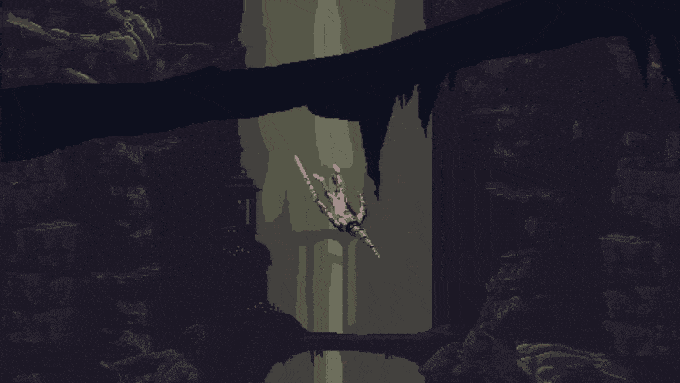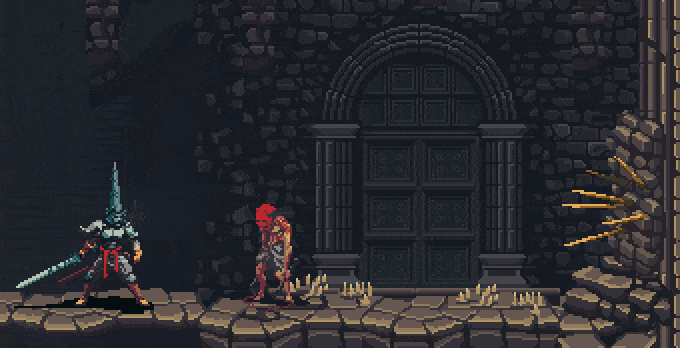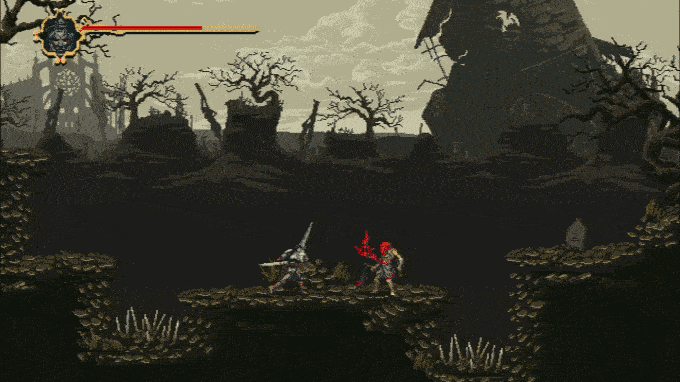Blasphemous hit Kickstarter just a few weeks ago, and already it’s crushed its goal. The upcoming action-platformer takes inspiration from Dark Souls and Castlevania, and looks to be a bloody, disturbing trip. It also has some incredible looking pixel art to say the least.
The Last Door, developer The Game Kitchens’ previous game, was a different story. It was a subtle point-and-click game with heavy Lovecraft influence and some genuinely unsettling moments. Fans of the game may be wondering what lead them down this different path. What they have in store for us? We reached out to them to figure out, and got some interesting answers…
 The Learning Process
The Learning Process
Cliqist: This is your second (already successful-congrats, by the way!) Kickstarter campaign. What lessons have you learned from the crowdfunding experience thus far?
The Game Kitchen: We did a great deal of preparation, for a period of about 6 months, working simultaneously on a playable prototype (on top of which the game will be laid out later) and actual campaign materials, so the winning strategy for us was to make these two lines of work compatible: all assets used in the campaign are game-ready and captured once incorporated in the playable [prototype]. Then we put a lot of effort building a community previous to the campaign launch, we set ourselves the goal of getting 5,000 followers on twitter and likes on Facebook, and we’ve been publishing interesting content at least once a day, for the last 4 months.
Finally we put a lot of effort on communicating our intentions with this game in a simple, clear and attractive way in the campaign’s page, which we’ve been iterating for weeks until reaching the version [that] got published in the end.
Changes from The Last Door
Cliqist: What lead to wanting to make a more action-oriented game like Blasphemous? Do you foresee any difficulty with programming a tighter, combat-focused game?
TGK: After working for 4 years on The Last Door, we needed a departure from the adventure genre. We were looking for something appealing to a slightly bigger audience, a little bit easier to communicate (you won’t believe how hard to is to convince people to give The Last Door a try, with those huge pixels as the only thing to judge the game), but especially something that get us really excited as well. Yes, it is a really different genre, and it’s going to be a challenge, but the team is really up to it.
Cliqist: One of my favorite aspects of The Last Door was the sound design. It built an oppressive atmosphere around the player. Will we still see that level of subtle audio detail?
TGK: Well these two are going to be totally different titles in terms of artistic intention. For The Last Door it was all about transmitting an eerie atmosphere, and towards that goal, audio was one of the main drives. Blasphemous being an action game, the audio requires a different artistic approach, but at least you know how much we care about audio in our products, so despite being new treatment, we’d do our best to make it equally remarkable.
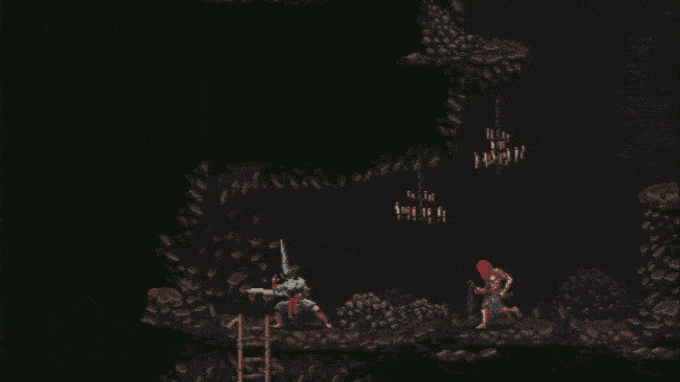 Cliqist: Despite being an action game, Blasphemous still has horror elements in it similar to The Last Door. Do you think it’s possible to create a fun, combat-driven game yet still terrify and unsettle players? Would you consider Blasphemous a horror game in this regard, or will it be more about tension in combat itself?
Cliqist: Despite being an action game, Blasphemous still has horror elements in it similar to The Last Door. Do you think it’s possible to create a fun, combat-driven game yet still terrify and unsettle players? Would you consider Blasphemous a horror game in this regard, or will it be more about tension in combat itself?
TGK: Blasphemous is not a horror game per se, but we will be using what we’ve learned from The Last Door to create the right mood while exploring this new world, and to create the anticipation before the boss fights.
Cliqist: It’s unique to see a developer work with their community to help build their game and world. How did the community shape The Last Door’s content? Do you have any advice for other developers that would open their development process in a similar manner?
TGK: Many developers [only develop in secrecy], but for us [it’s an] opportunity to harness the collective intelligence towards the creation of a better product. It creates a very special bond between the developer and their audience, and it really makes a difference in the quality of the product, and the amount of value your IP is delivering back, because suddenly it’s not just a game, but a complete experience.
A Unique Atmosphere
Cliqist: Aside from Lovecraft, what other creators inspired you to make Blasphemous and The Last Door?
TGK: Well… lots of them: Arthur Machen, Guy de Maupassant, Bram Stoker, Arthur Conan Doyle. Edgar Allan Poe, Stevenson…
Cliqist: Will there be some in-game lore we can find to learn more about the insane-looking creatures we’re fighting? Or will storytelling stick to an environmental approach?
TGK: In Blasphemous, bits of narrative could be found scattered in many of the game’s elements, scenery backgrounds, item descriptions and short dialogues with NPCs and bosses. Players will be able to connect the dots and make sense of the game’s lore, building a story for the game out of their own interpretations.
Cliqist: It was refreshing to see the term “Souls-Like” missing from your campaign page. Despite this, do you feel like the game will hit that level of “tough-but-fair” difficulty? Do you think action games should be difficult to feel rewarding, or are there other ways to achieve that feeling?
TGK: I don’t think that is absolutely necessary for an action game to be rewarding to be difficult. I recall playing Doom when I was really young, and sometimes I enjoyed turning on the invincibility cheat so I [could] forget about the difficulty and just enjoy the party for a brief moment. Another example is the first stage of Metal Slug, which is kind of easy, but still awesome and rewarding. Dark Souls works the other way around, it accumulates frustration to deliver a powerful reward sensation when you finally win a fight and release all the accumulated frustration at once. We are working hard to find a balance between difficulty, choice in use of items and strategy, and henceforth make a satisfactory experience for players.
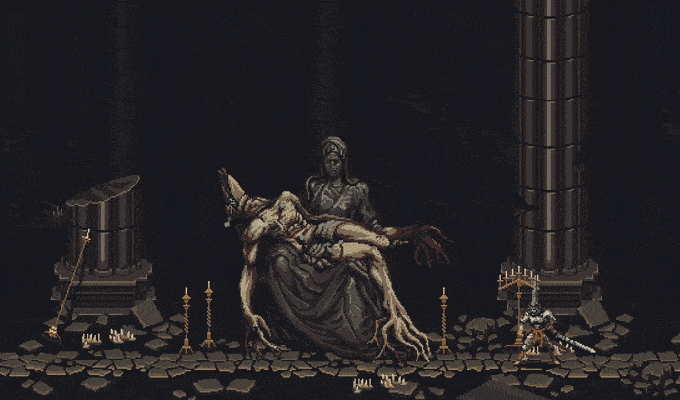 There you have it. The Game Kitchen seems passionate about putting together a fun, balanced action game. It will be interesting to follow Blasphemous‘ development and see what it ultimately turns into over time. At the very least, they’re confident they can deliver something just as memorable as The Last Door.
There you have it. The Game Kitchen seems passionate about putting together a fun, balanced action game. It will be interesting to follow Blasphemous‘ development and see what it ultimately turns into over time. At the very least, they’re confident they can deliver something just as memorable as The Last Door.
